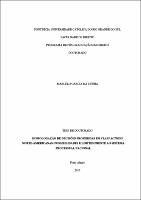| Share record |


|
Please use this identifier to cite or link to this item:
https://tede2.pucrs.br/tede2/handle/tede/7413| Document type: | Tese |
| Title: | Homologação de decisões proferidas em class actions norte-americanas : possibilidades e limites frente ao sistema processual nacional |
| Author: | Cunha, Marcelo Garcia da  |
| Advisor: | Tesheiner, José Maria Rosa |
| Abstract (native): | A internacionalização e a homogeneização das relações jurídicas, fenômeno que se reflete de modo inexorável nos marcos do processo civil contemporâneo, notadamente na sua vertente coletiva, convergem para a problematização do tema referente ao reconhecimento de sentenças estrangeiras, meio processual que tradicionalmente viabiliza a circulação extraterritorial dos atos jurisdicionais. A sentença estrangeira, em regra, produz efeitos no Brasil após prévia homologação pelo Superior Tribunal de Justiça, mediante procedimento específico no qual serão aferidos requisitos predominantemente formais, que condicionam a plena ou a parcial eficácia do ato sentencial no território nacional. No entanto, a jurisprudência sobre o assunto está pautada nas demandas individuais. Não há um posicionamento sistemático a respeito de pedido de homologação de sentença coletiva estrangeira. O mesmo se pode afirmar em relação ao regramento legal e à doutrina, visto que não apresentam abordagem tópica específica. A proposta de estudo, aqui, envolve as ações de classe provenientes da jurisdição norte-americana. Nesse sentido, propõe-se problematizar a atuação jurisdicional nacional frente a pedido de homologação de sentença proferida no âmbito de class action, abarcando aspectos teóricos e práticos que singularizam esse tema e que oferecem dificuldades na solução de questões que poderão emergir em casos concretos. Considera-se como premissa fundamental de trabalho que a sentença coletiva estrangeira, incluindo a resultante de ação de classe norte-americana, como regra geral, não encontra óbice à homologação no Brasil, visto que, embora inexista norma específica acerca da matéria, a admissibilidade decorre do próprio sistema processual nacional, que acolhe, em larga escala, as ações coletivas, conferindo-lhes ampla funcionalidade na resolução de macrolides que emergem na sociedade atual. As simetrias entre os sistemas processuais coletivos estudados (brasileiro e estadunidense) se sobrepõem às distinções, notadamente pela característica preocupação de ambos de conferir garantias aos direitos coletivos em discussão, sem que isso implique qualquer mitigação da imparcialidade do órgão julgador. Esse traço finalístico se projeta no processo de homologação de decisão resultante da class action, auxiliando no equacionamento de problemas teórico-práticos que emergem da matéria. |
| Abstract (english): | The internationalization and homogenization of legal relations, a phenomenon that is inexorably reflected in the framework of contemporary civil process, especially in its collective perspective, converge to the problematization of the theme concerning the recognition of foreign judgments, a procedural means that traditionally makes possible the extraterritorial circulation of judicial acts. The foreign judgment, as a rule, takes effect in Brazil after prior approval by the Superior Court of Justice, through a specific procedure in which predominantly formal requirements will be assessed, which condition the full or partial effectiveness of the sentence in the national territory. However, the jurisprudence on the subject is based on the individual demands. There is no systematic positioning regarding the request for homologation of a collective foreign judgment. The same can be said in relation to legal regulation and doctrine, since they do not present specific topical approach. The study proposal here involves class actions coming from the United States jurisdiction. In this sense, it is proposed to problematize the national jurisdictional action against a request for homologation of a sentence pronounced in the context of class action, covering theoretical and practical aspects that singles out this theme and that present difficulties in solving questions that may emerge in concrete cases. It is considered as a fundamental premise of work that the foreign collective ruling, including that resulting from the american class action, as a general rule, does not find obstacles to homologation in Brazil, since, although there is no specific rule on the matter, admissibility derives from the national process system itself, which welcomes, on a large scale, collective actions, giving them wide functionality in solving big controversy that emerge in today's society. The symmetry between the collective process systems studied (brazilian and american), overlaps with the distinctions, notably due to the characteristic concern of both to grant guarantees to the collective rights under discussion, without this implying any mitigation of the impartiality of the judicial body. This finalistic trait is projected in the homologation process resulting from class action, aiding in the equation of theoretical-practical problems that emerge from matter. |
| Keywords: | Class Action Estadunidense Ação Coletiva Brasileira Simetrias Distinções Efeitos no Território Nacional Homologação |
| CNPQ Knowledge Areas: | CIENCIAS SOCIAIS APLICADAS::DIREITO |
| Language: | por |
| Country: | Brasil |
| Publisher: | Pontifícia Universidade Católica do Rio Grande do Sul |
| Institution Acronym: | PUCRS |
| Department: | Escola de Direito |
| Program: | Programa de Pós-Graduação em Direito |
| Access type: | Acesso Aberto |
| Fulltext access restriction: | Trabalho apresenta restrição para publicação |
| URI: | http://tede2.pucrs.br/tede2/handle/tede/7413 |
| Issue Date: | 21-Mar-2017 |
| Appears in Collections: | Programa de Pós-Graduação em Direito |
Files in This Item:
| File | Description | Size | Format | |
|---|---|---|---|---|
| TES_MARCELO_GARCIA_DA_CUNHA_PARCIAL.pdf | Texto Parcial | 226.36 kB | Adobe PDF |  Download/Open Preview |
Items in DSpace are protected by copyright, with all rights reserved, unless otherwise indicated.




